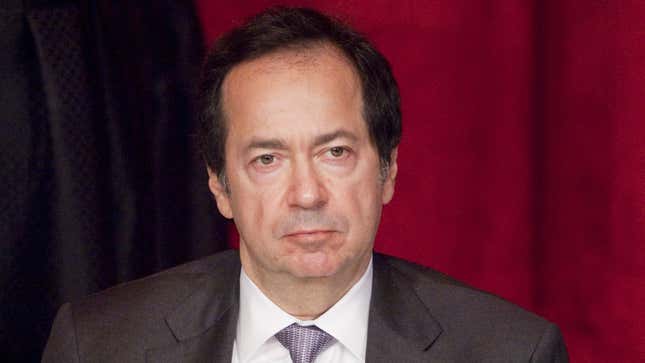The smoke has cleared, but the rubble and wreckage of the recent crash in gold prices is still being assessed. For years, the yellow metal has been a favorite of financial Masters of the Universe. In the aftermath of the share decline in gold prices, some of the so-called “smart money” crowd looks like they might have their Mensa membership revoked. Here’s a look at some of the highest profile financiers to find themselves on the wrong side of the gold market.
John Paulson, Paulson & Co.

The man who was made famous by the brilliant bet against the housing market that made him a billionaire during the financial crisis has been one of the most avid gold bulls in recent years. He launched the Paulson Gold Fund to focus on the metal in January 2010, and it did remarkably well early on, netting him roughly $5 billion in 2010. But the Financial Times reports that his losses on gold positions are pushing $1.5 billion so far this year (paywall). By some estimates Paulson’s funds lost nearly $1 billion alone in the sharp two-day selloff that sent gold prices into a technical bear market.
David Einhorn, Greenlight Capital

Hedge fund manager David Einhorn has also been a booster of gold for a good while. His rationale was that gold made sense as a hedge against a Federal Reserve that appeared—and still appears—to be going full throttle on an easy money policy. If you believe that could risk inflation somewhere down the line, buying gold would be a sensible response. In an October letter to shareholders, Einhorn stated that gold made a material contribution to the performance of his fund, adding that a “large attribution to gold seems like a very good idea.” More recently, in his January letter to shareholders, Einhorn admitted, “We took some lumps as gold declined.” At the end of the year, gold was disclosed as one of the funds largest “long” positions (which means he was betting the price would rise). Was Einhorn agile enough to sidestep the bulk of the gold bloodbath? Investors had better hope so.
Bill Gross, Pimco

Bill Gross, who rules over Newport Beach, Calif.-based asset management powerhouse Pimco, is best known as a master of the fixed income universe. But in recent years, he’s also expressed widespread skepticism about the Federal Reserve’s effort to restart US economic growth with money creation. So perturbed was Gross that instead of picking some sort of bond investment as the thing to own in 2013, he very publicly told investment bible Barron’s that his top investment pick for 2013 was gold. “All central banks are trying to reflate their economies. If they are successful, gold is an inflationary hedge and bonds, at least long-term bonds, aren’t,” Gross said. The gold ETF Gross recommended, GLD, has been destroyed by the gold crash, forcing Gross kinda, sorta admit he got this one wrong.
Kyle Bass, Hayman Capital
Known as an up-and-comer in the world of hedge funds, Kyle Bass has a well-established bullish bent on gold. And as an advisor to the University of Texas Investment Management Company, he’s been a vocal proponent of a bet on the metal, which had the Texas University system endowment manager holding more than $1 billion worth of gold bullion as recently as February. “I’m against selling any of the gold,” Bass said back then. And just a few days ago he was on record saying he was “perplexed as to why gold is as low as it is.” He’s likely even more perplexed, as gold has moved 12% lower since then.
Daniel Loeb, Third Point
Though he likes to keep a somewhat lower profile than some of his colleagues among star hedge fund managers, Loeb—billionaire management of Third Point—shared their enthusiasm toward gold in recent months. In his most recent letter to shareholders—which, to be fair, reported a respectable 9% return for 2013—he detailed gold as one of his top positions. And he also acknowledged that it was one of his worst performers.